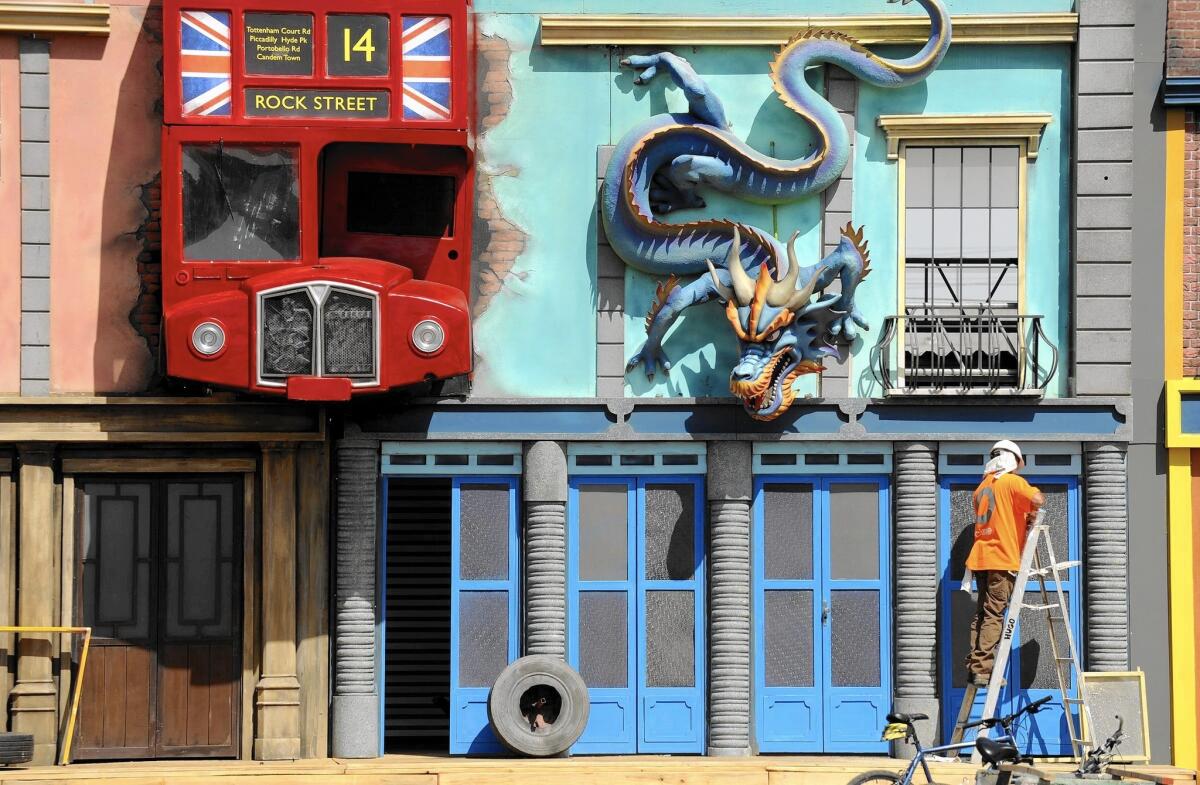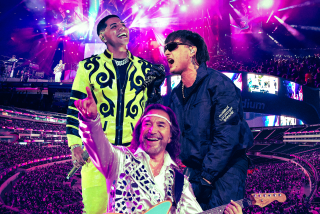Rock in Rio takes a gamble by coming to Las Vegas

Reporting from LAS VEGAS â They made it in South America and Europe. But can they hit the jackpot here?
Thatâs the challenge for Roberto Medina, the Brazilian entrepreneur who is bringing his decades-old Rock in Rio music festival to the U.S. this month for two weekends of concerts spread across 40 acres on the Las Vegas Strip.
------------
FOR THE RECORD
8:45 a.m.: An earlier version of this article said Rock in Rio would take place next month in Las Vegas. The festival is May 8-9 and May 15-16.
-------------
Touring the festival grounds in a golf cart as construction was underway, Medina describes an event that is part concert, part amusement park and part street party.
Concert stages may be the main draw, but there will be thrill rides and themed streets designed to evoke thoroughfares in Brazil, Britain and the U.S.
âI want people to feel a city. Yes, itâs only two weeks, but itâs a real city,â Medina, 67, said, removing his hard hat and wiping back his silver coif as he examined a row of storefronts.
Industry observers say Rock in Rio USA has two hurdles to overcome. One is standing out in Las Vegas, a city with entertainment options 24/7; and the other is making a mark in a landscape packed with established music festivals such as Lollapalooza, Bonnaroo and the recently wrapped Coachella Valley Music and Arts Festival.
âItâs a new site, which means nobody really knows what to even expect,â said Gary Bongiovanni, president and editor in chief of concert industry trade publication Pollstar. âThe biggest difficulty it has is trying to get out of the shadow of Coachella.
âBut if theyâre successful in pulling it off and creating a great environment, then that will bode [well] for future years.â
In its favor, Rock in Rio has a staggering track record â 7 million tickets sold since 1985 at festivals in Brazil, Portugal and Spain; $23 million contributed to social and environmental causes; substantial economic boosts to the cities â and a lineup heavy on popular mainstream acts.
Metallica, No Doubt, ManĂĄ, Linkin Park, Foster the People, Gary Clark Jr. and Bleachers will anchor the festivalâs rock-leaning first weekend (May 8 and 9). Taylor Swift, Bruno Mars, Sam Smith, John Legend, Ed Sheeran, Jessie J and Big Sean top the following weekâs pop bill. There will be more than 100 acts in all, and both weekends also feature a curated lineup of electronic acts.
General admission tickets cost $169 a day, $298 for a weekend. One-day VIP passes, with access to a plush two-story structure, catered buffet and open bar, cost $498.
Occupying acreage that once served as the recreational vehicle campground for Circus Circus, the custom-made âCity of Rockâ will be able to accommodate 85,000 people per day, and organizers spent $25 million to overhaul the site, including building permanent electrical, water and sewage infrastructure.
Medina says his company is spending $50 million to cover other operating costs, including booking talent and an aggressive, yearlong media campaign. He said he has already recouped $14 million of that by selling sponsorships to corporations, including Mercedes-Benz and Corona, and the rest will hinge on sales of tickets and concessions.
About 102,000 weekend passes have already been sold, roughly split between the two weekends, according to organizers, and VIP passes for May 9 and May 16 have already sold out. Half of that tally is from ticket buyers from the Los Angeles area, the rest is split between Las Vegas residents and buyers from 32 countries, organizers said.
âThe truth is, most major festivals lose money in their first year or two,â Bongiovanni said. âSo, it wouldnât be surprising if it doesnât meet expectations the first time around.â
Aside from six stages of music â including a 360-degree, nightclub-like electronic stage â there is a 600-foot zip line that will send festival-goers flying over the main stage, a Ferris wheel in the shape of a giant roulette wheel and three themed miniature ârock streetsâ inspired by U.S., Britain and Brazil.
Its key selling points, though, are what it lacks: No port-a-potties. No crowded food tents or ATM lines â guests load money on their wristbands for payment â no camping in brutal heat and no snarled traffic in and out of the festival grounds.
âThis is the same, or more, comfort you [would] have in a closed arena,â Medina said.
Medina founded an advertising agency in Brazil and got into the concert business in 1980 when he persuaded Frank Sinatra to come to Brazil. The show drew 180,000 people, a Guinness world record at the time,
Five years later, he launched the first Rock in Rio festival â 10 days of concerts that drew an estimated 1.4 million people.
In 2013 Medina began discussions to bring Rock in Rio to the U.S. He met with Cirque du Soleil, which was looking to get into the music festival business and persuaded Medina to consider the West Coast.
âAt most of the other Rock in Rios, they are partnering with cities that build their site according to their specifications,â said Martin Boudreau, Cirqueâs vice president of business development. âIn Las Vegas, it became obvious to us after a few discussions that it would be difficult to make that kind of deal with the city.â
Cirque used its long-standing relationship with MGM Resorts International (it has shows at six MGM properties) to bring the hotel conglomerate on board. But MGMâs existing festival site in Vegas, the Village, was only 15 acres.
After months of little progress and the possibility of having to rethink Las Vegas, though, MGM saw an opportunity in the sprawling, dusty campground next to Circus Circus.
âWe sort of purposely built it to fit some of [the] specifications for Rock in Rio, but for the type of investment we put into it, which is around $20 million, the only way for it to make sense was to have additional events there,â said Chris Baldizan, senior vice president of entertainment for MGM Resorts International.
The permanent, open-air venue, now called MGM Festival Grounds, is a joint venture among MGM, Cirque and Ron Burkleâs the Yucaipa Cos. Itâs committed to hosting Rock in Rio biannually; 2017 and 2019 are already guaranteed. MGM also recently announced the Academy of Country Musicâs three-day Party for a Cause will set up there next April.
âWeâre looking at food festivals, sporting events, conventions,â Baldizan said. âThatâs the vision.â
The original appeal of Rock in Rio is what lured Cirque, but Boudreau said the new venue is a game changer for the city.
âThe investment in the site was something we needed to do to make it happen,â he said. âBut now that the site has taken form ... there is so much demand for other promoters and other event organizers that wanted a location like this on the Strip. Itâs an amazing infrastructure.â
Bringing Rock in Rio to the States extends the brandâs reach to U.S. audiences and offers a strong addition to Las Vegasâ growing festival market and is part of Medinaâs long-term plan to build a global brand (conversations with promoters in the Middle East and Asia are ongoing) â a rarity for music festivals.
The impresario admits, though, it hasnât been the easiest sell.
âI think the big challenge I have is credibility,â he said. âThis is new for people, and Iâm restarting. Obviously I have experience. But itâs strange. Itâs like youâre put at zero. And itâs tiring.â
That said, Medina may have a secret weapon in his host city. Las Vegas is a prime tourist destination, with plenty of hotel rooms to accommodate last-minute ticket buyers.
âThis is not Coachella; youâre not camping,â said Baldizan, adding that the festival grounds âare within walking distance of 80,000 hotel rooms.â
âPeople can have their usual Vegas stay ⌠and then walk or take a shuttle to this great music festival and head back to the Strip, which will still be going on,â he said.
Indeed, Las Vegas is the obvious added attraction for Rock in Rio, said Paul Tollett, president and chief executive of Goldenvoice, the AEG subsidiary that puts on the Coachella and Stagecoach festivals.
Tollett said the Electric Daisy Carnival, a dance music festival, has thrived in Las Vegas (it drew a record crowd of more than 400,000 last year), and that Rock in Rio will probably burnish the cityâs reputation as a live music destination.
âNever underestimate Vegas,â he said.
Times staff writer Randy Lewis contributed to this report.
More to Read
From the Oscars to the Emmys.
Get the Envelope newsletter for exclusive awards season coverage, behind-the-scenes stories from the Envelope podcast and columnist Glenn Whippâs must-read analysis.
You may occasionally receive promotional content from the Los Angeles Times.











